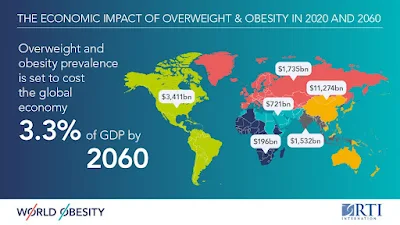Introduction
Obesity, a growing global health epidemic, has far-reaching economic consequences that extend beyond individual health costs.
Individual Health Costs
Individuals with obesity often face significantly higher healthcare costs compared to those with a healthy weight.

The Economic Toll of Obesity: A Global Health Crisis
National Healthcare Costs
The economic burden of obesity extends beyond individual costs and has a substantial impact on national healthcare systems.
Cost to Business and Lost Productivity
Obesity can also have a detrimental effect on businesses and the overall economy.
Government Policies and Economic Implications
Government policies play a crucial role in addressing the obesity epidemic.
Conclusion
The economic consequences of obesity are far-reaching and have a significant impact on individuals, healthcare systems, businesses, and governments worldwide.
References
- Canaway, A., Frew, E., Lancashire, E., Pallan, M., Hemming, K., Adab, P. and WAVES trial investigators, 2019. Economic evaluation of a childhood obesity prevention programme for children: Results from the WAVES cluster randomised controlled trial conducted in schools. PloS one, 14(7), p.e0219500.
- Ding, Y., Fan, X., Blanchette, C.M., Smolarz, B.G., Weng, W. and Ramasamy, A., 2020. Economic value of nonsurgical weight loss in adults with obesity. Journal of Managed Care & Specialty Pharmacy, pp.1-13.
- Kim, Y., Cubbin, C. and Oh, S., 2019. A systematic review of neighbourhood economic context on child obesity and obesity‐related behaviours. Obesity Reviews, 20(3), pp.420-431.
- Kim, Y., Lee, H. and Park, A., 2020. Adverse childhood experiences, economic hardship, and obesity: Differences by gender. Children and Youth Services Review, 116, p.105214.
- Kuroki, M., 2016. Life satisfaction, overweightness and obesity. International Journal of Wellbeing, 6(2).
- Minos, D., Butzlaff, I., Demmler, K.M. and Rischke, R., 2016. Economic growth, climate change, and obesity. Current obesity reports, 5(4), pp.441-448.
- Molyneaux, E., Pasupathy, D., Kenny, L.C., McCowan, L.M.E., North, R.A., Dekker, G.A., Walker, J.J., Baker, P.N., Poston, L., Howard, L.M. and SCOPE consortium, 2016. Socio-economic status influences the relationship between obesity and antenatal depression: data from a prospective cohort study. Journal of Affective Disorders, 202, pp.124-127.
- Newton, S., Braithwaite, D. and Akinyemiju, T.F., 2017. Socio-economic status over the life course and obesity: Systematic review and meta-analysis. PloS one, 12(5), p.e0177151.
- Roche, M., Law, T.Y., Kurowicki, J., Rosas, S. and Rush III, A.J., 2018. Effect of obesity on total knee arthroplasty costs and revision rate. The journal of knee surgery, 31(1), p.38.
- Sinha, I., Mondal, N. and Sen, J., 2018. Effects of socio-economic, demographic and lifestyle variables on overweight and obesity among rural Rajbanshi post-menopausal women of India. Anthropologischer Anzeiger; Bericht uber die biologisch-anthropologische Literatur, 75(3), pp.251-262.
- Soskolne, V., Cohen-Dar, M., Obeid, S., Cohen, N. and Rudolf, M.C., 2018. Risk and protective factors for child overweight/obesity among low socio-economic populations in Israel: a cross sectional study. Frontiers in endocrinology, 9, p.456.
No comments:
Post a Comment